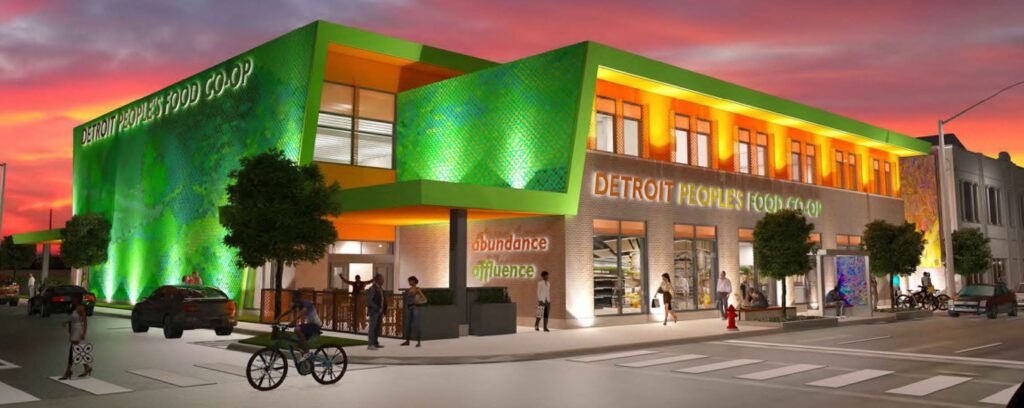
Michigan Community Capital among CDE’s supporting Detroit Food Commons development with New Markets Tax Credit allocations
FOR IMMEDIATE RELEASE
March 30, 2022
LANSING, Mich. – A newly constructed two-story, 31,000-square-foot building on Woodward Avenue in Detroit will house Detroit Food Commons. The nearly $20-million project spearheaded by nonprofits Detroit Black Community Food Security Network (DBCFSN) and Develop Detroit (DDI) has been made possible in part with $7 million in New Markets Tax Credits (NMTC) allocated from Michigan Community Capital (MCC) this week. Located within a CDFI-qualified severely distressed census tract, the project will directly address a severe lack of access to fresh food in the North End neighborhood of Detroit.
The mixed-use building will include Detroit People’s Food Co-op (the Co-op) on the first floor — a community-owned grocery selling healthy, locally sourced food, a deli and bakery, and a neighborhood café. The second floor will include two large and two small licensed incubator kitchens to serve local food enterprises, a 3,800-square-foot community event and banquet space, and office space for the headquarters of DBCFSN.
The ground-level grocery will provide healthy, affordable options to more than 31,000 low–income community members and over 19,000 food desert residents within a 1.5-mile trade radius. The Co-op already has 1,455 member-owners, underscoring the pent-up demand for high-quality grocers in the neighborhood.
The Co-op and DBCFSN will directly create or retain approximately 41 full-time equivalent jobs in a census tract where 59.6% of the population falls below the poverty line. All of these positions will be accessible to people with less than a four-year degree of accredited education.
According to DBCFSN Executive Director Malik Yakini, “the Detroit Food Commons will be a game changer. Not only will the anchor tenant, the Detroit People’s Food Co-op, provide greater access to fresh, healthy, nutrient dense foods, but it also provides an important model of community ownership and what moving towards a more racially just economy looks like.”
Project costs are expected to be roughly $20 million; Michigan Community Capital will provide $7 million in New Markets Tax Credit allocation.
“Access to healthy and affordable food is essential for a thriving community,” said Eric Hanna, president and CEO at Michigan Community Capital. “By supporting this project, we’re reaching thousands of community members in need of this access, and we’re investing in multiple minority-owned businesses involved in the process. This project helps establish a system where money to purchase this food will now circulate back to Detroiters.”
U.S. Bank is supporting the project with New Markets Tax Credit allocation investment.
“U.S. Bank is excited about this unique project that will bring fresh and healthy food to area residents, provide jobs for the local community, and attract and support entrepreneurs with its incubator kitchens and event space,” said Jennifer Stoehr, vice president with U.S. Bancorp Community Development Corporation (USBCDC), the community investment and tax credit division of U.S Bank. “We’re committed to supporting projects that drive racial equity, and that’s why we’re not only supporting Detroit Food Commons as a NMTC investor but bringing NMTC allocation through our own community development entity.”
Local Initiatives Support Corporation (LISC Detroit) is supporting the project with New Markets Tax Credit allocation investment.
“New Markets Support Company (NMSC), in conjunction with LISC Detroit, is proud to contribute new markets tax credits in support of the Detroit Food Commons,” said Donna Nuccio of NMSC. “The project is centered around community ownership and will provide ongoing benefits in the form of access to healthy food and support of local businesses, which aligns with our mission of advancing equitable outcomes. We look forward to the continued collaboration to make this project a success.”
National Cooperative Bank is supporting the project as a direct lender.
“As a socially responsible financial institution, National Cooperative Bank (NCB) is proud to be the direct lender in the Detroit Commons Project,” stated Michael Novak, senior vice president of Commercial Banking at NCB. “For over 40 years, NCB has had a mission to support the growth of food co-ops nationwide, especially in underserved communities. Having access to fresh, healthy food is a basic ingredient to sustainable communities and we look forward to working with Michigan Community Capital and all the project partners on this development.”
To learn more about Detroit Black Community Food Security Network and Detroit Food Commons Development Project visit www.detroitpeoplesfoodcoop.com.
About Michigan Community Capital
Michigan Community Capital (MCC) is a non-profit diversified public-private partnership that supports the missions of the Michigan Economic Development Corporation (MEDC) and the Michigan State Housing Development Authority (MSHDA) by aggregating capital and facilitating the financing and development of low-income and attainable housing, and the redevelopment of complex brownfield sites within the State of Michigan. MCC is a U.S. Treasury certified Community Development Financial Institution (CDFI) and the only Community Development Entity (CDE) that deploys this resource solely throughout the entire State of Michigan. Over its 16-year history, MCC has supported over $1 billion in project financing, successfully attracted $320 million in federal New Markets Tax Credits, and helped to create over 750 housing units and 1.3 million square feet of commercial, retail and industrial space to facilitate job creation and expansion. MCC provides products in four key pillars: housing equity, bridge and gap lending, New Markets Tax Credits, and property insurance for Low-Income Housing Tax Credit projects. For more information on MCC visit michigancommunitycapital.org.
###
